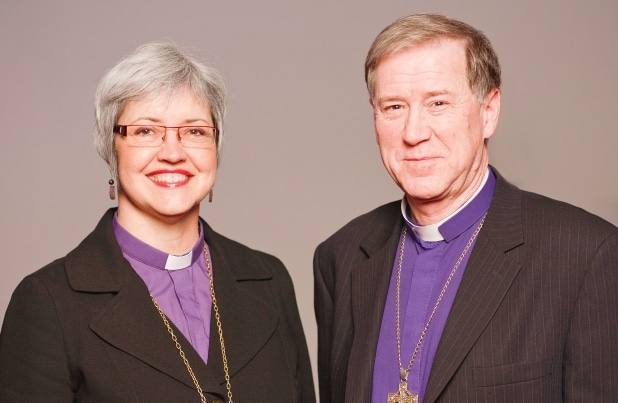A statement on Earth Day, April 22, 2014 from Archbishop Fred Hiltz, Primate of the Anglican Church of Canada and Bishop Susan Johnson, National Bishop of the Evangelical Lutheran Church in Canada.
“This fragile Earth, our island home”
At your command all things came to be:
The vast expanse of interstellar space,
Galaxies, suns, the planets in their courses, and this fragile earth, our island home;
By your will they were created and have their being.
Glory to you forever and ever.
This year’s observance of Earth Day follows immediately on the events of Good Friday and Easter Sunday. In them we see movements from enmity to reconciliation, suffering to hope, and death to new life. They speak not only to humanity but also to the interconnectedness of all of creation.
The Scriptures tell us that our first vocation as human beings is to tend God’s creation. An honest assessment of our diligence in that call inevitably leads us to confess “our waste and pollution of creation and our lack of concern for those who come after us.” (Ash Wednesday Liturgy)
Reports on the state of the environment as documented by the UN Intergovernmental Panel on Climate Change are increasingly alarming. Of particular concern is the global collapse of oceans and the serious consequences already borne by the poorest nations. At a climate conference in Warsaw last November, there was an emotional outpouring from countries that face existential threats, among them Bangladesh, which produces just 0.3 per cent of the emissions driving climate change.
In the face of increasing concern and vulnerability in the world voiced especially by the poor and the young, what word does the church speak? What action do we take?
We learn from global partners. A call from the Anglican Communion Environmental Network to a deeper commitment to the fifth Mark of Mission shared by Anglicans worldwide influenced the Anglican church’s recent decision to have candidates for baptism make an additional vow “to strive to safeguard the integrity of creation and respect, sustain, and renew the life of the earth.” (An Act of General Synod, 2013). A call from the Lutheran World Federation (LWF) delegation to COP 19 in Warsaw, Poland (November 11-22, 2013), which included seven young adults, led the Lutheran church to join a global monthly fast in prayerful solidarity with people affected by climate change (#fastfortheclimate).
We raise awareness. Anglican and Lutheran Youth have taken up the challenge of raising awareness of the “Right to Water” through a joint National Youth Project. Our churches commend the UN effort to reach a global treaty in 2015 to secure a global agreement on a net zero emissions goal. Canada, with the second highest greenhouse gas emissions intensity per capita of the G8 countries[i], is expected to announce an emission-reduction target for 2030 that would be significantly lower than 2020 levels. While progress is being made, without new measures, absolute emissions in 2030 would be projected to reach 815 megatonnes — 81 megatonnes more than projected for 2020.
We act. As Full Communion partners, our churches are committed to learn about issues of resource extraction and the effects on environment, health, Indigenous peoples, communities and economies and to raise awareness within our communities and with policy shapers and decision makers. We support our partners in defining their own development goals, including supporting Indigenous communities in Canada and elsewhere in exercising their right to Free, Prior and Informed Consent; and act to embed enforceable legal obligations based on FPIC in Canadian policies and practices with respect to resource extraction. We advocate for responsible and ethical investment and actions by individuals, faith communities, corporations, and governments both in Canada and around the world. And, we pray for the humility and discipline to use Earth’s resources wisely and responsibly. These are commitments we are working to put into action.
With our ecumenical and interfaith partners – KAIROS; the Commission on Justice and Peace of the Canadian Council of Churches; the Canadian Interfaith Conversation — we are committed to act from “our faith traditions and sacred texts … to consider the spiritual dimensions of the crisis of ocean and climate change; to take stock of our collective behaviour; to transform cultures of consumerism and waste into cultures of sustainability; and to respect the balance between economic activity and environmental stewardship.” (Canadian Interfaith Call for Leadership and Action on Climate Change, 2011)
We encourage each other to act. We invite individuals, parishes, congregations, dioceses and synods to increase their “stewardship of creation” through green audits, greening strategies and practices that show how much “creation matters.”
We pray. Good Friday reminds us that we have a Saviour who is able to sympathize with our weaknesses and the suffering of creation. Easter Sunday reminds us that we are witnesses of all God does for us, and that we begin each day forgiven and free.
On this Earth Day, our hope is that we will rise up more conscious than ever of our first vocation as human beings caring for the Earth with the utmost respect for the Creator and the utmost regard for the generations of all those who come after us.
From the primal elements
You brought forth the human race,
And blessed us with memory, reason, and skill;
You made us the stewards of creation.
Glory to you for ever and ever.
Interested in keeping up-to-date on news, opinion, events and resources from the Anglican Church of Canada? Sign up for our email alerts .

